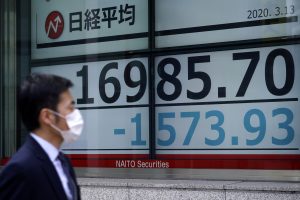The COVID-19 coronavirus pandemic continues. The outbreak occurred in China in the closing days of 2019, spread to South Korea, Japan and other Asian countries in February and is now affecting nearly every country on the planet. In March, the center of the epidemic moved to Europe and North America, prompting governments there to take unprecedented actions, including strict lockdowns.
The restrictions, which have included prohibitions on going out for anything other than essential purposes, have inevitably produced an economic contraction of historic severity. Goldman Sachs anticipates that U.S. GDP will contract an astonishing 34 percent on an annualized basis in the second quarter of 2020, following a 9 percent fall in the first quarter. The Bank of America and JPMorgan Chase & Co. now respectively estimate 30 and 25 percent declines in U.S. GDP for the second quarter.
This global economic disruption has profound implications for Asian countries, many of which are looking to restore their own economies after containing the first wave of the coronavirus outbreak. Despite substantial progress within the region in combating the pandemic, stock prices in Asian markets sank in March, directly impacted by worldwide stock weakness.
This has prompted talk of a recurrence of the 1998 Asian Financial Crisis. Certainly, the economic foundations of Asian countries are far more solid now, and their foreign currency reserves are on a completely different scale, which rules out any easy comparison. At the same time, however, the foreign currency reserves held by many Asian countries are in the form of securities issued by the United States and other countries. The steep declines in stock prices around the world are therefore having a major influence on foreign currency reserves. As the impact of the global economic downturn is greatest for export-dependent economies, the future for Asia is highly uncertain.
A good example is South Korea, the fourth largest economy in Asia. Unlike Japan and China, which have relatively large domestic markets and are thus somewhat less reliant on exports, the ratio of foreign trade to GDP in South Korea stood at 83 percent in 2018. Logically, that current global economic underperformance will have severe repercussions for the country, with S&P now forecasting negative growth for South Korea in 2020. With significant declines in the stock market and in the Korean won, the outlook for the Korean economy is bleak.
One of the few rays of hope for South Korea’s Moon Jae-in Administration was the temporary U.S. dollar liquidity arrangements (swap lines) established on March 19, 2020 between the U.S. Federal Reserve Board (FRB) and the Bank of Korea. In fact, on that day the FRB established similar arrangements with the central banks of nine countries (Australia, Brazil, South Korea, Mexico, Singapore, Sweden, Denmark, Norway and New Zealand), a reproduction of measures taken in 2007-2009 in the aftermath of the Lehman Shock. The FRB stated that the purpose of this measure is “to help lessen strains in global U.S. dollar funding markets, thereby mitigating the effects of these strains on the supply of credit to households and businesses, both domestically and abroad.”
As the statement suggests, it is vital to maintain a global financial system that benefits all countries. In other words, an economic crisis cannot be ignored just because it is taking place in another country. Central banks establish swap lines as a fundamental means of avoiding sovereign default and easing tensions in the financial markets. The benefits of the arrangement will be felt not just in countries with weak currencies but also in the other participating countries. Recognizing this is essential to understand why the FRB set up the swap lines despite the Trump Administration’s “America First” policies.
Asian countries, in most cases much stronger economically than they were twenty years ago, should be setting up their own currency safety net. Unfortunately, there is no sign of this happening. One barrier is the contentious territorial issues related and historical differences that persist throughout the region, and the accompanying nationalism. This is most serious for China, Japan and South Korea, the first, second and fourth largest economies in Asia, respectively, who have repeatedly clashed over these issues. For example, South Korea’s Moon Administration has wholeheartedly welcomed the swap lines arrangement with the U.S., but has shown no signs of officially wanting to create a similar agreement with Japan, despite having done so previously, due to disputes stemming from the historical use of conscripted workers (forced labor) and export controls.
With a devastating coronavirus pandemic and an unprecedented economic crisis, now is the time to consider a detente, setting aside territorial conflicts and historical differences and rebuilding currency, banking and economic systems so that the region can emerge from the crisis. If countries become prisoners of their own nationalist pride in the face of this serious crisis, they risk inflicting deeper wounds on themselves and exacerbating the economic and political damage. Surely this writer is not the only person who believes that with Europe and North America naturally preoccupied with their own tremendous challenges, now is the time for Asian leaders to demonstrate leadership.
Kan Kimura is a professor at Kobe University.
































